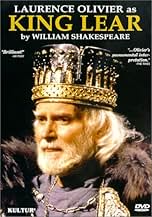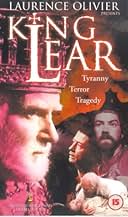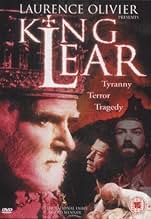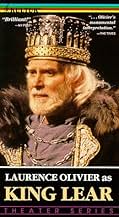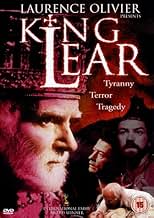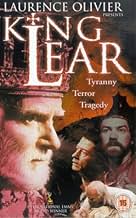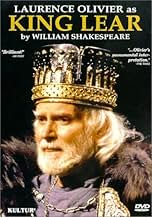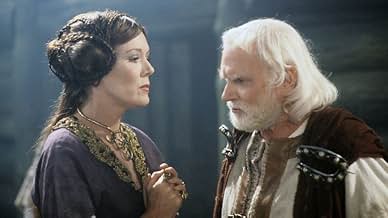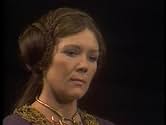Füge eine Handlung in deiner Sprache hinzuAging King Lear invites disaster when he abdicates to his two disloyal and obsequious daughters while rejecting the one who truly loves him.Aging King Lear invites disaster when he abdicates to his two disloyal and obsequious daughters while rejecting the one who truly loves him.Aging King Lear invites disaster when he abdicates to his two disloyal and obsequious daughters while rejecting the one who truly loves him.
- 1 Primetime Emmy gewonnen
- 2 Gewinne & 3 Nominierungen insgesamt
Empfohlene Bewertungen
This TV production was Laurence Olivier's final great performance, playing Lear at the age of 75 (beyond him perhaps on stage but cleverly done here).
He is supported by a large cast of stage actors - Dorothy Tutin, Anna Calder-Marshall and Diana Rigg as his daughters; Robert Lindsay and David Threlfall as the warring brothers Edmund and Edgar; Colin Blakely as Kent; Leo McKern as Gloucester; John Hurt as The Fool - all of which make their impact. The staging is memorable and pulls the viewer in to the action.
Comparable to really being there watching the greats at work in the theatre, and a fantastic piece of television drama.
He is supported by a large cast of stage actors - Dorothy Tutin, Anna Calder-Marshall and Diana Rigg as his daughters; Robert Lindsay and David Threlfall as the warring brothers Edmund and Edgar; Colin Blakely as Kent; Leo McKern as Gloucester; John Hurt as The Fool - all of which make their impact. The staging is memorable and pulls the viewer in to the action.
Comparable to really being there watching the greats at work in the theatre, and a fantastic piece of television drama.
I am becoming increasingly aware that some of my favorite actors are just dumb, that they don't have a vision as grand as the work they are a part of. I don't know that this should be so surprising, given what it takes to be an actor.
Olivier both acts and directs here, and what we have is a shame because he just doesn't understand this play, the important half anyway. Half of the play is about the relationships among people, specifically about the parent-child relationship and its regal surrogate of fealty (the fool, Kent and Gloucester to the King). When Olivier is relating to one of these, he is marvelous.
But half of the play is about Lear's relationship to unseen demons, sprites, devils. He sees and relates to these as intensely and with as much duration as with the daughters. (This is mirrored by Gloucester who cannot see them.) In this part of the play, roughly the middle, the language comes alive as it takes us into the Elizabethan equivalent of science fiction. This is some of the best language in Shakespeare, which is to say the best stuff anywhere.
And what does Olivier give us? Mumbling, sometimes under the wind noise. The fulcrum of this magic is the sequence with the Fool and Poor Tom. It is the heart of the magic, which Shakespeare later amplified with the `trial.' Olivier cuts most of that, and gives us a muddle. (Literally, Tom wallowing in the mud.)
The music is horrid, as it is with his much earlier Hamlet. The swordplay is bombastic. The sets are cheesy, especially the faux Stonehenge. If he understood the importance of Stonehenge, why drop the notion of magic in the core of the play? I just don't get it: I don't understand how he couldn't get it.
At the very last page, Lear kneels over the dead Cordelia and says `my poor fool is hanged.' Then looking for life in a magical revival asks to have HER button undone, which likely undoes a garment like that we have seen on the long-lost Fool. Rich stuff that, as big a twist as `Sixth Sense.' But Olivier slurs over on his way to rambling about dogs and rats and then asks for HIS button to be undone. My my.
Advice: Lear is one of the very best of the plays. I'll grant that Olivier is a fine actor, but this is a very poor offering indeed. Ignore.
Olivier both acts and directs here, and what we have is a shame because he just doesn't understand this play, the important half anyway. Half of the play is about the relationships among people, specifically about the parent-child relationship and its regal surrogate of fealty (the fool, Kent and Gloucester to the King). When Olivier is relating to one of these, he is marvelous.
But half of the play is about Lear's relationship to unseen demons, sprites, devils. He sees and relates to these as intensely and with as much duration as with the daughters. (This is mirrored by Gloucester who cannot see them.) In this part of the play, roughly the middle, the language comes alive as it takes us into the Elizabethan equivalent of science fiction. This is some of the best language in Shakespeare, which is to say the best stuff anywhere.
And what does Olivier give us? Mumbling, sometimes under the wind noise. The fulcrum of this magic is the sequence with the Fool and Poor Tom. It is the heart of the magic, which Shakespeare later amplified with the `trial.' Olivier cuts most of that, and gives us a muddle. (Literally, Tom wallowing in the mud.)
The music is horrid, as it is with his much earlier Hamlet. The swordplay is bombastic. The sets are cheesy, especially the faux Stonehenge. If he understood the importance of Stonehenge, why drop the notion of magic in the core of the play? I just don't get it: I don't understand how he couldn't get it.
At the very last page, Lear kneels over the dead Cordelia and says `my poor fool is hanged.' Then looking for life in a magical revival asks to have HER button undone, which likely undoes a garment like that we have seen on the long-lost Fool. Rich stuff that, as big a twist as `Sixth Sense.' But Olivier slurs over on his way to rambling about dogs and rats and then asks for HIS button to be undone. My my.
Advice: Lear is one of the very best of the plays. I'll grant that Olivier is a fine actor, but this is a very poor offering indeed. Ignore.
I had seen King Lear on the stage with Louis Calhern when I was too young to fully appreciate it. The Olivier version was deeper with fine nuances in his performance evidencing his full insight of the meaning of this tragedy. A must for every parent. It teaches one more than all the popular books on parenting.
I've never been that impressed with Olivier's acting. His Hamlet seemed quite boring. That changed after I saw this and his "Merchant of Venice." As Olivier got older, he got better. No more grandstanding, no more showy heroes. Having seen other Lears waste the role with constant shouting or with boringly stone-faced acting, I was impressed with the range of emotion Olivier revealed here. This Lear was the only one I could pity. He seems more hurt than angry by Cordelia's "Nothing." He shifts instantly between self-pity, blind rage, and knowledge, just as Lear does in the text.
The music was awful. Terribly melodramatic. Almost ruined the film.
Diana Rigg is absolutely chilling as Reagan and the Fool is touchingly dependent on Lear. Far less caustic than I imagined him.
This isn't the "definitive" Lear. There isn't one. But this comes close.
The music was awful. Terribly melodramatic. Almost ruined the film.
Diana Rigg is absolutely chilling as Reagan and the Fool is touchingly dependent on Lear. Far less caustic than I imagined him.
This isn't the "definitive" Lear. There isn't one. But this comes close.
The foremost Shakespearean actor of the 20th century took on what he considered his most challenging role when he did a television production of King Lear in 1983. Laurence Olivier said that because Lear is on stage so much of the time as the title character and is an old man, that it's an impossible role to play when you're young and starting out. And by the time you have the acting chops for the job you might just be too old to endure the rigors of playing it on stage.
Olivier had retired from the stage in the early Seventies and he would not take on the rigors of a play. But this televised production is his swansong to the immortal Bard. It's a tribute to Olivier's skill as an actor that he gets all the emotions going with Lear at once, pride, vanity, sorrow, and a bit of stupidity thrown in.
The story of the old king dividing his realm of Britain comes from the early days post the Roman occupation of Britain. Lear is a mythical king much as Arthur is from that period. His greatest sin is that he stayed around too long, he's in his eighties and his daughters have been waiting for their inheritance. The Eighties is a decent lifespan for any human, but in those days it was nothing less than remarkable someone would live that long.
Shakespeare also had a more recent example of a monarch giving up his power and dividing his realm. The great Emperor Charles V in 1555 gave up the Hapsburg empire which included both the Holy Roman Empire and the Kingdom of Spain and all the lands in the old and new worlds it possessed. Spain went to his son and the Holy Roman Empire went to his brother. They had their problems, but it was sure more peaceful than how it went with daughters Regan and Goneril played by Diana Rigg and Dorothy Tutin. As for Charles V, he lived the rest of his life peacefully in a monastery away from the cares of running a huge chunk of the world's real estate, dying in 1557.
There's a third daughter Cordelia played by Anne-Calder Marshall. When Lear the old fool asks each daughter how much they love him, the other two throw the flattery on with a shovel. Cordelia hesitates with her answer and gets banished in an arbitrary act. Absolute monarchs like Lear tend to act arbitrarily. That's part of the plot.
The secondary storyline concerns the Duke of Gloucester played by Leo McKern and his sons, one legitimate and the other out of wedlock. The legitimate one Edgar is played by David Threlfell and Edmund the illegitimate son is played by Robert Lindsay. Edmund is a calculating villain much like Iago in Othello. He manages to turn the Duke against Edgar, but he's after much bigger stakes than that, wooing Regan and Goneril behind their husband's back. It leads to war and a wholesale slaughter of the cast much like Hamlet.
Lear is a fool and has a fool played by John Hurt. Next to Olivier, he's the one you'll remember in the cast. Back in those days nobility were the only ones who could afford professional entertainment and the fool came on in his Harlequin outfit, say a few amusing things, but listen real close. Hurt sees an observes a lot and he's trying a few subtle suggestions to his master about the errors he made.
Set in ancient times King Lear's story is one repeated over and over again about staying in power too long, the resentments will build and the intrigues will follow. Shakespeare saw enough of that in his time both with his two monarchs Elizabeth I and James I. But he couldn't write about them lest his head be parted from his shoulders. I do wonder if some of the court politicians in those reigns saw a bit of themselves in King Lear.
Olivier had retired from the stage in the early Seventies and he would not take on the rigors of a play. But this televised production is his swansong to the immortal Bard. It's a tribute to Olivier's skill as an actor that he gets all the emotions going with Lear at once, pride, vanity, sorrow, and a bit of stupidity thrown in.
The story of the old king dividing his realm of Britain comes from the early days post the Roman occupation of Britain. Lear is a mythical king much as Arthur is from that period. His greatest sin is that he stayed around too long, he's in his eighties and his daughters have been waiting for their inheritance. The Eighties is a decent lifespan for any human, but in those days it was nothing less than remarkable someone would live that long.
Shakespeare also had a more recent example of a monarch giving up his power and dividing his realm. The great Emperor Charles V in 1555 gave up the Hapsburg empire which included both the Holy Roman Empire and the Kingdom of Spain and all the lands in the old and new worlds it possessed. Spain went to his son and the Holy Roman Empire went to his brother. They had their problems, but it was sure more peaceful than how it went with daughters Regan and Goneril played by Diana Rigg and Dorothy Tutin. As for Charles V, he lived the rest of his life peacefully in a monastery away from the cares of running a huge chunk of the world's real estate, dying in 1557.
There's a third daughter Cordelia played by Anne-Calder Marshall. When Lear the old fool asks each daughter how much they love him, the other two throw the flattery on with a shovel. Cordelia hesitates with her answer and gets banished in an arbitrary act. Absolute monarchs like Lear tend to act arbitrarily. That's part of the plot.
The secondary storyline concerns the Duke of Gloucester played by Leo McKern and his sons, one legitimate and the other out of wedlock. The legitimate one Edgar is played by David Threlfell and Edmund the illegitimate son is played by Robert Lindsay. Edmund is a calculating villain much like Iago in Othello. He manages to turn the Duke against Edgar, but he's after much bigger stakes than that, wooing Regan and Goneril behind their husband's back. It leads to war and a wholesale slaughter of the cast much like Hamlet.
Lear is a fool and has a fool played by John Hurt. Next to Olivier, he's the one you'll remember in the cast. Back in those days nobility were the only ones who could afford professional entertainment and the fool came on in his Harlequin outfit, say a few amusing things, but listen real close. Hurt sees an observes a lot and he's trying a few subtle suggestions to his master about the errors he made.
Set in ancient times King Lear's story is one repeated over and over again about staying in power too long, the resentments will build and the intrigues will follow. Shakespeare saw enough of that in his time both with his two monarchs Elizabeth I and James I. But he couldn't write about them lest his head be parted from his shoulders. I do wonder if some of the court politicians in those reigns saw a bit of themselves in King Lear.
Wusstest du schon
- WissenswertesEsmond Knight (Old Man) previously appeared in all three Shakespearean films directed by Laurence Olivier: Heinrich V. (1944), Hamlet (1948) and Richard III. (1955).
- VerbindungenFeatured in The 36th Annual Primetime Emmy Awards (1984)
Top-Auswahl
Melde dich zum Bewerten an und greife auf die Watchlist für personalisierte Empfehlungen zu.
Details
Zu dieser Seite beitragen
Bearbeitung vorschlagen oder fehlenden Inhalt hinzufügen


